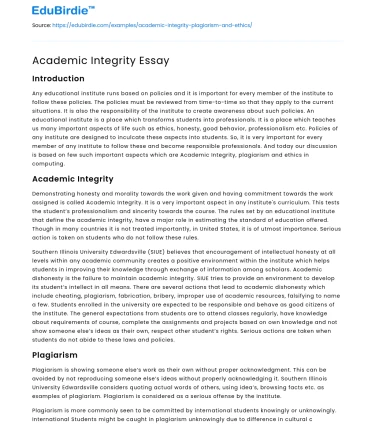Introduction
Any educational institute runs based on policies and it is important for every member of the institute to follow these policies. The policies must be reviewed from time-to-time so that they apply to the current situations. It is also the responsibility of the institute to create awareness about such policies. An educational institute is a place which transforms students into professionals. It is a place which teaches us many important aspects of life such as ethics, honesty, good behavior, professionalism etc. Policies of any institute are designed to inculcate these aspects into students. So, it is very important for every member of any institute to follow these and become responsible professionals. And today our discussion is based on few such important aspects which are Academic Integrity, plagiarism and ethics in computing.
Academic Integrity
Demonstrating honesty and morality towards the work given and having commitment towards the work assigned is called Academic Integrity. It is a very important aspect in any institute's curriculum. This tests the student’s professionalism and sincerity towards the course. The rules set by an educational institute that define the academic integrity, have a major role in estimating the standard of education offered. Though in many countries it is not treated importantly, in United States, it is of utmost importance. Serious action is taken on students who do not follow these rules.
Save your time!
We can take care of your essay
- Proper editing and formatting
- Free revision, title page, and bibliography
- Flexible prices and money-back guarantee
Southern Illinois University Edwardsville (SIUE) believes that encouragement of intellectual honesty at all levels within any academic community creates a positive environment within the institute which helps students in improving their knowledge through exchange of information among scholars. Academic dishonesty is the failure to maintain academic integrity. SIUE tries to provide an environment to develop its student’s intellect in all means. There are several actions that lead to academic dishonesty which include cheating, plagiarism, fabrication, bribery, improper use of academic resources, falsifying to name a few. Students enrolled in the university are expected to be responsible and behave as good citizens of the institute. The general expectations from students are to attend classes regularly, have knowledge about requirements of course, complete the assignments and projects based on own knowledge and not show someone else’s ideas as their own, respect other student’s rights. Serious actions are taken when students do not abide to these laws and policies.
Plagiarism
Plagiarism is showing someone else’s work as their own without proper acknowledgment. This can be avoided by not reproducing someone else’s ideas without properly acknowledging it. Southern Illinois University Edwardsville considers quoting actual words of others, using idea’s, browsing facts etc. as examples of plagiarism. Plagiarism is considered as a serious offense by the institute.
Plagiarism is more commonly seen to be committed by international students knowingly or unknowingly. International Students might be caught in plagiarism unknowingly due to difference in cultural conceptions or English not being their primary language of communication or difference in the way educational institutes function in their home country to that of United States. For example, in India, plagiarism is never considered seriously resulting in students copying their work from fellow students or taking content from the internet directly and presenting it, where as in United States, plagiarism is given utmost importance and it may even lead to the expulsion of student from educational institute.
Ethics
Association for Computing Machinery (ACM) has quoted that “Computing Professional’ actions change the world”. The general ethical principals to be followed by computing professionals and students according to ACM are as below:
- Skills are to be used for the greater benefit of the society.
- Avoid information disclosure.
- Best practices need to be followed in all works.
- Be honest.
- Be fair to others.
- Respect the effort of others to develop any idea.
- Confidentiality needs to be maintained.
- Maintain standards of professionalism and conduct
- Know the rules that every individual need to abide to
- Do not present false information
- Do not falsify the results of experiments
Many institutes follow the code of ethics defined by ACM. It defines how a professional should behave in all respects and be honest with the work done by them. Serious actions are taken when these principles are not followed.
Measure to be taken by Students
Plagiarism can be avoided by the students by taking few measures. Below are some examples:
- Understand the concept well and try to articulate your own thoughts.
- If something needs to be taken from a paper then, use quotes to indicate the same.
- Provide proper citation.
- Acknowledge any ideas taken from any other source.
- Citation needs to be provided even if you use your own previous works.
- Once your paper is done, review it.
- Check if all references and citations are provided.
By following these steps, even unintentional plagiarism can be avoided.
Conclusion
Maintain academic integrity and avoiding any kind of misconduct is of utmost importance, as it would affect student’s career. Being caught in any kind of academic misconduct affects not only a student’s life in university but also affects his overall career. It remains as a mark in their profile. International students especially should be really careful about this, as it is considered a serious offense in the United States and can be expelled from the country and may not return too.
References
- https://www.siue.edu/policies/1q5.shtml
- https://www.siue.edu/policies/3c2.shtml
- https://prism.ucalgary.ca/handle/1880/110295
- https://www.acm.org/code-of-ethics
- https://www.siue.edu/policies/1i6.shtml






 Stuck on your essay?
Stuck on your essay?

